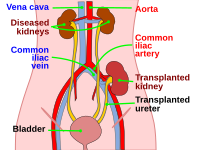
Photo from wikipedia
Abstract Background: Although the use of expanded-criteria donors (ECDs) alleviates the problem of organ shortage, it significantly increases the incidence of delayed graft function (DGF). DGF is a common complication… Click to show full abstract
Abstract Background: Although the use of expanded-criteria donors (ECDs) alleviates the problem of organ shortage, it significantly increases the incidence of delayed graft function (DGF). DGF is a common complication after kidney transplantation; however, the effect of DGF on graft loss is uncertain based on the published literature. Hence, the aim of this study was to determine the relationship between DGF and allograft survival. Methods: We conducted a retrospective, multicenter, observation cohort study. A total of 284 deceased donors and 541 recipients between February 2012 and March 2017 were included. We used logistic regression analysis to verify the association between clinical parameters and DGF, and Cox proportional hazards models were applied to quantify the hazard ratios of DGF for kidney graft loss. Results: Among the 284 deceased donors, 65 (22.8%) donors were ECD. Of the 541 recipients, 107 (19.8%) recipients developed DGF, and this rate was higher with ECD kidneys than with standard-criteria donor (SCD) kidneys (29.2% vs. 17.1%; P = 0.003). The 5-year graft survival rate was not significantly different between SCD kidney recipients with and without DGF (95.8% vs. 95.4%; P = 0.580). However, there was a significant difference between ECD kidney recipients with and without DGF (71.4% vs. 97.6%; P = 0.001), and the adjusted hazard ratio (HR) for graft loss for recipients with DGF was 1.885 (95% confidence interval [CI] = 1.305–7.630; P = 0.024). Results showed that induction therapy with anti-thymocyte globulin was protective against DGF (odds ratio = 0.359; 95% CI = 0.197–0.652; P = 0.001) with all donor kidneys and a protective factor for graft survival (HR = 0.308; 95% CI = 0.130–0.728; P = 0.007) with ECD kidneys. Conclusion: DGF is an independent risk factor for graft survival in recipients with ECD kidneys, but not SCD kidneys.
Journal Title: Chinese Medical Journal
Year Published: 2020
Link to full text (if available)
Share on Social Media: Sign Up to like & get
recommendations!